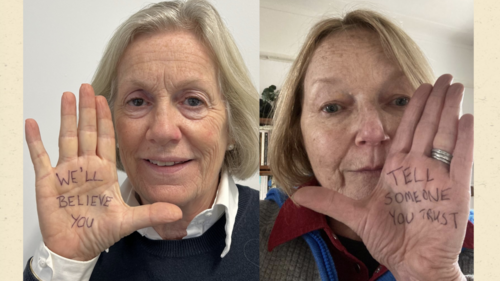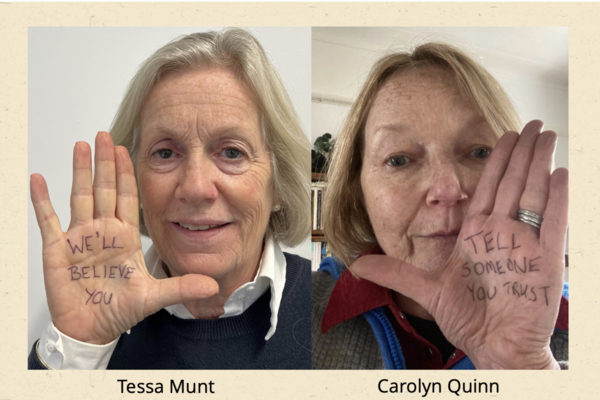Stopping child sexual abuse is in our hands

Child Protection professionals in Somerset united this weekend for Stop Child Exploitation Day 2023, joining the national #HelpingHands campaign to #EndCSEin23.
Stop Child Exploitation Day aims to highlight the issues surrounding child sexual exploitation, encouraging people to think, spot and speak out against abuse, and adopt a zero-tolerance attitude to adults developing inappropriate relationships with children, or children exploiting and abusing their peers.
Cllr Tessa Munt, Somerset County Council’s Executive Member for Children and Families, is a survivor of child sexual abuse. As an MP, she campaigned for a national independent inquiry into historic sexual abuse. That Inquirynlooked at institutional abuse spanning religious settings, schools, youth organisations and Parliament itself.
Tessa said: “My childhood experiences made me absolutely passionate about child safeguarding, and I work with a team that feels the same – teachers, social workers, health visitors, police officers, nurses and councillors alike – every one of them ‘gets it’, and we are all here to protect children and young people.
“Child Sexual Abuse is a terrible experience and it’s really important that children know that if they come forward, they will be believed.
“Abusers often tell children they won’t be believed, and this is one of the ways they seek to control their victims. This campaign both encourages children and young people to tell someone they trust what’s happening to them, and helps adults spot the signs of abuse. That’s the way to put control back in the hands of young people experiencing abuse.
“I understand what it’s like. It took me 21 years to tell anyone what had happened to me. I couldn’t find the words. At the time, Childline didn’t even exist. When Parliament finally came round to the idea of setting up an Inquiry, they still didn’t really listen. In 2014, I shared my story, speaking to Carolyn Quinn – a journalist whom I trusted not to focus on me, but to understand that I was speaking from personal experience and understood the situations others face.”
Carolyn Quinn, a BBC radio journalist for 36 years before her retirement last month, said: “Tessa waited too many years before feeling able to talk publicly in a BBC Radio 4 interview about what had happened to her. Please don’t do the same. Don’t keep it inside. Wherever you live across the country, if you’re worried or frightened, please tell someone you trust about it now.”
Child Sexual Exploitation (CSE) is a criminal offence and is sexual abuse which targets children or young people.
When children are exploited in this way, they may be given affection, gifts or money in exchange for involvement in sexual activities. Through these actions, known as ‘grooming’, children may trust their abuser and believe they are part of a loving and consensual relationship.
CSE might also involve violence, threats and coercion. In all cases, the victim will be controlled in some way by their abuser. Children and young people can be trafficked into or around the country and forced into sexual activity, often with more than one person.
According to the National Society for the Prevention of Cruelty to Children (NSPCC), common signs of CSE are:
· Being engaged in unhealthy or inappropriate sexual behaviour
· Being frightened of some particular places, people or situations
· Being secretive
· Sharp changes in mood or character
· Having money or things they won’t explain
· Physical signs like bruises or bleeding
· Alcohol or drug issues
· Sexually transmitted infections
· Pregnancy
Somerset County Council, where Tessa is the elected Member for Children & Families, has specialist teams trained to work with exploited children. Children’s service workers have taken part in community action days with other services like the NHS and Police to raise awareness of the signs and indicators of exploitation with members of the public and local businesses. You can contact Children’s Services on 0300 123 2224 and email at childrens@somerset.gov.uk
If you suspect a child or young person is being abused, report it. In an emergency, always contact the police on 999. You can also contact the Police directly by phoning 101 and report to the agencies below:
•The NSPCC Helpline, available 7 days a week via the website or by emailing help@nspcc.org.uk or calling 0808 800 5000.
•Call Crimestoppers anonymously on 0800 555111 or use the link below:
Give information | Crimestoppers (crimestoppers-uk.org)

